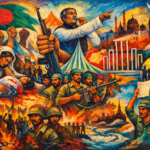The geopolitical landscape of Pakistan is a complex web of internal politics, historical violence, allegations of state-sponsored terrorism, and institutional covert activities. The recent granting of bail to former Prime Minister Imran Khan, on multiple charges, further underscores the tumultuous state of affairs in this South Asian nation. This paper aims to unpack the complexities of Pakistan’s past and present, examining its ties with terror outfits, its interventionist policies, the atrocities committed in the 1971 Bangladesh Massacre, the influence of its infamous deep state, and the Inter-Services Intelligence’s (ISI) covert operations.
The roots of Pakistan’s present predicament trace back to its early post-colonial years. The country’s history is rife with political instability, military coups, and accusations of state-sponsored terrorism, notably linked to the conflict in Jammu and Kashmir (Fair, 2014). Pakistan’s policy of strategic depth – using Afghanistan as a buffer zone against India – has seen it accused of colluding with terror outfits like the Taliban and Haqqani network. This has bred distrust among the international community, contributing to its reputation as an unreliable global partner (Byman, 2018).
Pakistan’s role in the 1971 Bangladesh Massacre is a stark reminder of its egregious human rights abuses. Accusations of genocide by the Pakistani military against the Bengali population in East Pakistan, leading to a death toll estimated to be in the hundreds of thousands (Khan, 2011), further blemishes its international standing. This grim chapter in history underscores a pattern of violence and manipulation by the Pakistani state apparatus.
Underlying these issues is the so-called ‘deep state’, a network of powerful military and intelligence elites who allegedly wield significant power over the country’s political and economic affairs. The ISI, the primary intelligence agency, is a critical component of this deep state. Their covert operations, ranging from political assassinations to support for extremist groups, have perpetuated a climate of fear and repression domestically while raising alarm bells internationally (Rashid, 2008).
The recent case of Imran Khan underscores the entrenched corruption and political instability. Accused of accepting property gifts for personal gain, his narrative becomes another instance of the alleged malpractice at the highest echelons of Pakistan’s political sphere. The violent protests following his arrest are reminiscent of the tumultuous history of the nation, characterized by public dissatisfaction and frequent political upheaval.
As Pakistan continues to grapple with these multifaceted issues, the future appears uncertain. The country needs to confront its past wrongdoings and promote transparency, accountability, and respect for human rights. Without substantial reforms in governance and a concerted effort to dismantle the vestiges of its deep state, Pakistan risks further isolation and internal strife.
In conclusion, the past and present actions of Pakistan underline a nation beset with myriad challenges. Its history of colluding with terror groups, interference in other nations’ affairs, past atrocities such as the 1971 Bangladesh Massacre, the influential deep state, and the notorious ISI and their covert activities have marred its international standing. The current situation surrounding Imran Khan is merely a symptom of a much deeper ailment. For Pakistan, the road ahead is fraught with challenges, but confronting these is a prerequisite for sustainable progress and international recognition.
Bibliography
- Byman, D. (2018). Deadly Connections: States that Sponsor Terrorism. Cambridge: Cambridge University Press.
- Fair, C. C. (2014). Fighting to the End: The Pakistan Army’s Way of War. Oxford: Oxford University Press.
- Khan, N. (2011). The Great Tragedy: A Historical Analysis of the 1971 Bangladesh Genocide. Dhaka: University Press Limited.
- Rashid, A. (2008). Descent into Chaos: The United States and the Failure of Nation Building in Pakistan, Afghanistan, and Central Asia. New York: Viking Press.
- #SouthAsiaCorner
- #SACToday
- #SouthAsiaNews
- #RegionalPerspectives
- #SACommunities
- #CultureConnects
- #SouthAsiaTogether
- #SAConversations
- #ExploreSouthAsia
- #SACTravel
- #SACTalks
- #SouthAsianHeritage
- #SACTrends
- #SouthAsiaInsights
- #SAConnects






